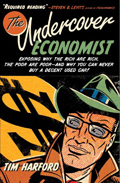 Following my recent interest in books on the psychology of decision-making and behavioral economics, I thought it might be interesting to read up on some actual economics. I had gotten some of this out of Freakonomics and Superfreakonomics by Levitt and Dubner, but Tim Harford’s Undercover Economist is a little less afraid to throw in actual economic theory and terms. So you get explanations of “perfect” markets, inefficiencies, externalities, and other economic jargon.
Following my recent interest in books on the psychology of decision-making and behavioral economics, I thought it might be interesting to read up on some actual economics. I had gotten some of this out of Freakonomics and Superfreakonomics by Levitt and Dubner, but Tim Harford’s Undercover Economist is a little less afraid to throw in actual economic theory and terms. So you get explanations of “perfect” markets, inefficiencies, externalities, and other economic jargon.
Which isn’t to say that the book isn’t interesting. In fact, Harford has a great style, and like those other books he couches his discussion of economics in everyday things that we’re all familiar with: buying a cup of coffee, health insurance, traffic, and orange juice. My favorite parts of the book were where he would look at very practical problems from a consumer’s point of view, such as why you have to pay so much more for coffee in certain locations and why “fancy” gourmet grocery stores will stock some of the same products as their bargain bin competitors, but use it to influence different purchasing patterns.
But there’s also larger scale discussions about China’s economic recovery (which I found really fascinating), the influence of corruption on small countries, and globalization. It’s interesting to see how an economist approaches these issues with an ultra rational approach to decision-making, and it’s pretty shocking to see the extremes to which that kind of thinking can you lead you –some of Harford’s propositions would nip problems like cross-town traffic or public health in the bud, but they may offend our sense of justice in the process. And Harford is grounded enough in reality to cop to that kind of thing, up to the point where you get just a little feeling of world weariness and cynicism. But not too much.
The Undercover Economist was a genuinely good and readable treatment of a rather opaque subject. It was one of my favorite books the year I read it.